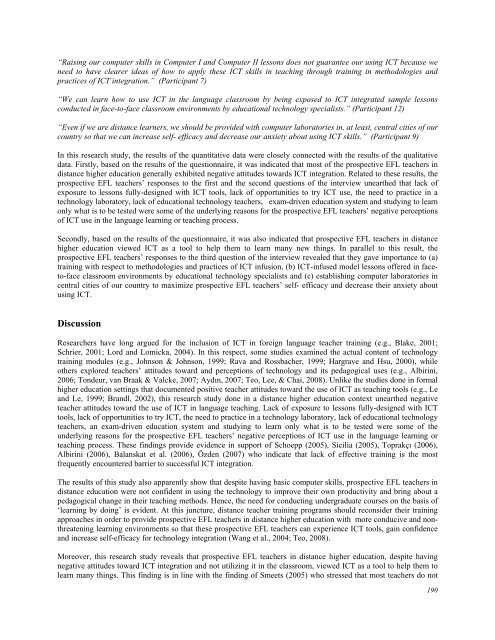January 2012 Volume 15 Number 1 - Educational Technology ...
January 2012 Volume 15 Number 1 - Educational Technology ...
January 2012 Volume 15 Number 1 - Educational Technology ...
You also want an ePaper? Increase the reach of your titles
YUMPU automatically turns print PDFs into web optimized ePapers that Google loves.
“Raising our computer skills in Computer I and Computer II lessons does not guarantee our using ICT because we<br />
need to have clearer ideas of how to apply these ICT skills in teaching through training in methodologies and<br />
practices of ICT integration.” (Participant 7)<br />
“We can learn how to use ICT in the language classroom by being exposed to ICT integrated sample lessons<br />
conducted in face-to-face classroom environments by educational technology specialists.” (Participant 12)<br />
“Even if we are distance learners, we should be provided with computer laboratories in, at least, central cities of our<br />
country so that we can increase self- efficacy and decrease our anxiety about using ICT skills.” (Participant 9)<br />
In this research study, the results of the quantitative data were closely connected with the results of the qualitative<br />
data. Firstly, based on the results of the questionnaire, it was indicated that most of the prospective EFL teachers in<br />
distance higher education generally exhibited negative attitudes towards ICT integration. Related to these results, the<br />
prospective EFL teachers’ responses to the first and the second questions of the interview unearthed that lack of<br />
exposure to lessons fully-designed with ICT tools, lack of opportunities to try ICT use, the need to practice in a<br />
technology laboratory, lack of educational technology teachers, exam-driven education system and studying to learn<br />
only what is to be tested were some of the underlying reasons for the prospective EFL teachers’ negative perceptions<br />
of ICT use in the language learning or teaching process.<br />
Secondly, based on the results of the questionnaire, it was also indicated that prospective EFL teachers in distance<br />
higher education viewed ICT as a tool to help them to learn many new things. In parallel to this result, the<br />
prospective EFL teachers’ responses to the third question of the interview revealed that they gave importance to (a)<br />
training with respect to methodologies and practices of ICT infusion, (b) ICT-infused model lessons offered in faceto-face<br />
classroom environments by educational technology specialists and (c) establishing computer laboratories in<br />
central cities of our country to maximize prospective EFL teachers’ self- efficacy and decrease their anxiety about<br />
using ICT.<br />
Discussion<br />
Researchers have long argued for the inclusion of ICT in foreign language teacher training (e.g., Blake, 2001;<br />
Schrier, 2001; Lord and Lomicka, 2004). In this respect, some studies examined the actual content of technology<br />
training modules (e.g., Johnson & Johnson, 1999; Rava and Rossbacher, 1999; Hargrave and Hsu, 2000), while<br />
others explored teachers’ attitudes toward and perceptions of technology and its pedagogical uses (e.g., Albirini,<br />
2006; Tondeur, van Braak & Valcke, 2007; Aydın, 2007; Teo, Lee, & Chai, 2008). Unlike the studies done in formal<br />
higher education settings that documented positive teacher attitudes toward the use of ICT as teaching tools (e.g., Le<br />
and Le, 1999; Brandl, 2002), this research study done in a distance higher education context unearthed negative<br />
teacher attitudes toward the use of ICT in language teaching. Lack of exposure to lessons fully-designed with ICT<br />
tools, lack of opportunities to try ICT, the need to practice in a technology laboratory, lack of educational technology<br />
teachers, an exam-driven education system and studying to learn only what is to be tested were some of the<br />
underlying reasons for the prospective EFL teachers’ negative perceptions of ICT use in the language learning or<br />
teaching process. These findings provide evidence in support of Schoepp (2005), Sicilia (2005), Toprakçı (2006),<br />
Albirini (2006), Balanskat et al. (2006), Özden (2007) who indicate that lack of effective training is the most<br />
frequently encountered barrier to successful ICT integration.<br />
The results of this study also apparently show that despite having basic computer skills, prospective EFL teachers in<br />
distance education were not confident in using the technology to improve their own productivity and bring about a<br />
pedagogical change in their teaching methods. Hence, the need for conducting undergraduate courses on the basis of<br />
‘learning by doing’ is evident. At this juncture, distance teacher training programs should reconsider their training<br />
approaches in order to provide prospective EFL teachers in distance higher education with more conducive and nonthreatening<br />
learning environments so that these prospective EFL teachers can experience ICT tools, gain confidence<br />
and increase self-efficacy for technology integration (Wang et al., 2004; Teo, 2008).<br />
Moreover, this research study reveals that prospective EFL teachers in distance higher education, despite having<br />
negative attitudes toward ICT integration and not utilizing it in the classroom, viewed ICT as a tool to help them to<br />
learn many things. This finding is in line with the finding of Smeets (2005) who stressed that most teachers do not<br />
190

















